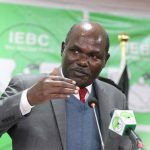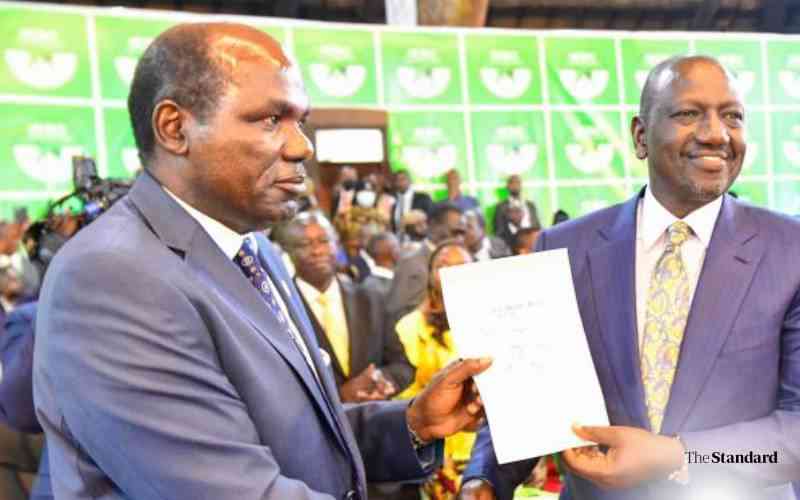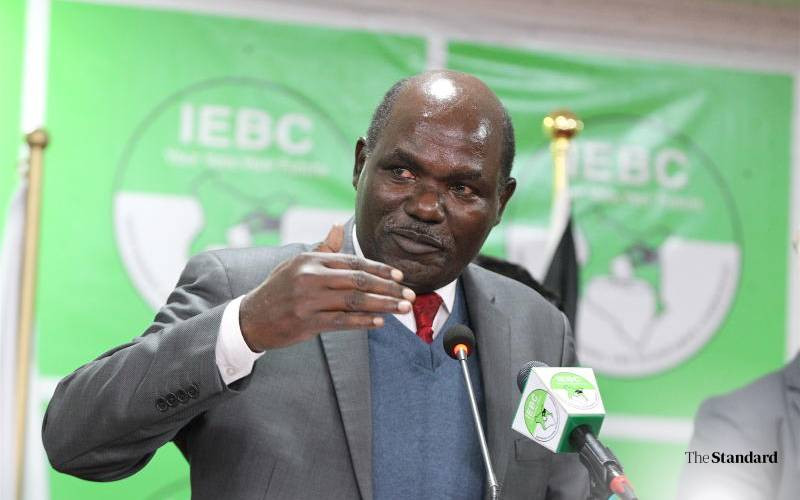He spent his sunset days at the electoral commission a jovial man. Wafula Chebukati, who died on Thursday evening aged 63, relished media appearances after the Supreme Court found out that he had presided over a credible presidential election in 2022.
The former chairperson of the Independent Electoral and Boundaries Commission (IEBC) had earned the approval he needed, which he hoped would whitewash his previous legacy of bungling a presidential election.
And he would repeat the Supreme Court’s findings to everyone who listened to that his IEBC had conducted Kenya’s most credible election yet.
“Where I have taken the Kenyan election is that simple word called transparency. That to me is the game changer for the Kenyan election. We put everything out there, into the public portal. All the results, accessible by everyone, within 48 hours,” Chebukati would declare at an exit interview before he retreated from the limelight that characterised his turbulent tenure.
President William Ruto would describe him as a “national hero” for weathering alleged pressure to alter the result of his last election as chair.
“I want to say without any fear of contradiction that Wafula Chebukati is our hero – soft-spoken but firm,” said an elated president-elect. He would repeat the statements for months after assuming the presidency. The days preceding the announcement of Ruto’s victory were long and hard for Chebukati, who was already contending with doubts about whether he could oversee a free and fair contest.
He reportedly spent days rejecting alleged invitations to skew the result one way and nights dodging the pressure, using unmarked cars and spending nights away from home, too afraid to land an unfortunate fate.
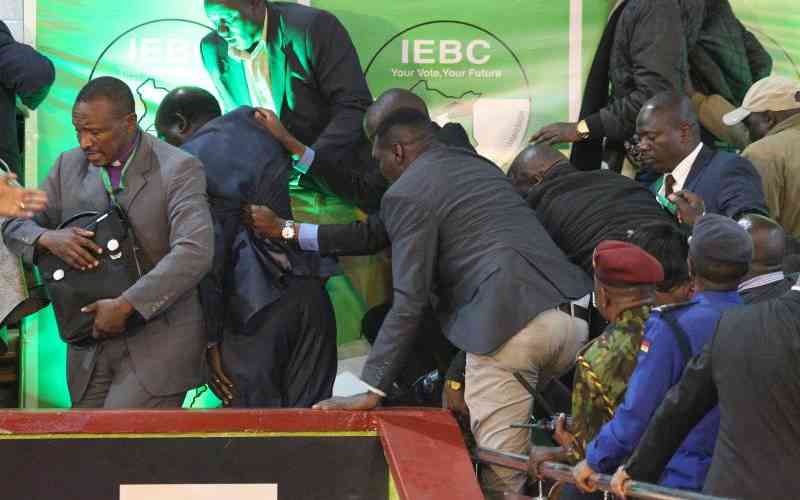
In a later interview, Ruto would sensationally claim that there had been an elaborate plan to abduct and “murder him “so that the commission would be paralysed.”
After all was said and done, Chebukati freed himself from hiding and honoured every invite that would have him recount how his commission had steered the 2022 presidential poll.
Of course, not everyone agreed with Chebukati’s and Dr Ruto’s assessment. To this day, opposition politician Raila Odinga believes he was cheated out of the presidency, which he marginally lost to Ruto.
Before a rowdy crowd at the Bomas of Kenya and amid blows, Chebukati announced Ruto the winner with 50.49 per cent of the vote. Raila had valid reasons to doubt Chebukati’s figures. As blows flew at Bomas, four other commissioners discredited the yet-to-be-announced result at the Serena Hotel.
Former Vice Chairperson Juliana Cherera led former commissioners Irene Masit, Justus Nyang’aya and Francis Wanderi in terming the election “opaque” and said they could not vouch for its credibility.
Stay informed. Subscribe to our newsletter
“The four of us are here and not at the Bomas of Kenya, where the result is going to be announced, because of the opaque nature of how this phase has been handled. We, therefore, cannot take ownership of the results that are going to be announced,” said Cherera.
Throughout his smear campaign during the 2022 presidential poll, Raila insisted that the views of three commissioners could not outweigh those of four, despite the Chief Justice Martha Koome-led Supreme Court finding that he was defeated fairly.
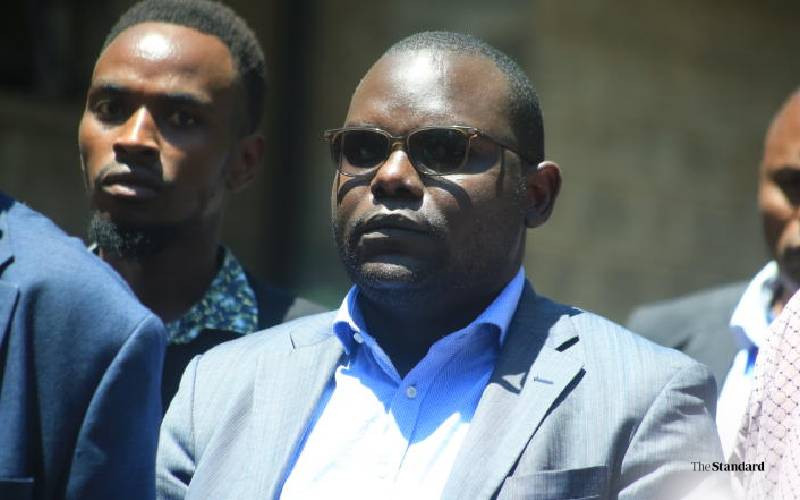
Days earlier, the IEBC had announced the suspension of gubernatorial elections in Mombasa and Kakamega, two strongholds of Raila’s, fuelling voter suppression suspicions. Chebukati had been used to such. In six years at the helm of the IEBC, Chebukati had been the subject of scathing attacks from the opposition.
They had everything to do with the bungling of the 2017 presidential election, which the former Chief Justice David Maraga-led Supreme Court nullified, citing constitutional breaches. Appointed months before the decisive poll, the task of delivering a credible contest was ever daunting.
Chebukati expressed confidence in his team, but it would take more than that to manage a proper election. The IEBC faltered, vindicating the opposition, which had long feared that there had been plans to rig the polls.
Disputed election
Raila has always borne such fears, exacerbated by the disputed 2007 election, which saw the late former Electoral Commission of Kenya chair Samuel Kivuitu announce former President Mwai Kibaki as winner, despite admitting that the presidential poll had been fraudulent.
After losing to former President Uhuru Kenyatta five years later, Raila led a successful push to oust former IEBC chairperson Issack Hassan. Chebukati’s appointment was aimed to quell the opposition’s perennial vote-rigging concerns.
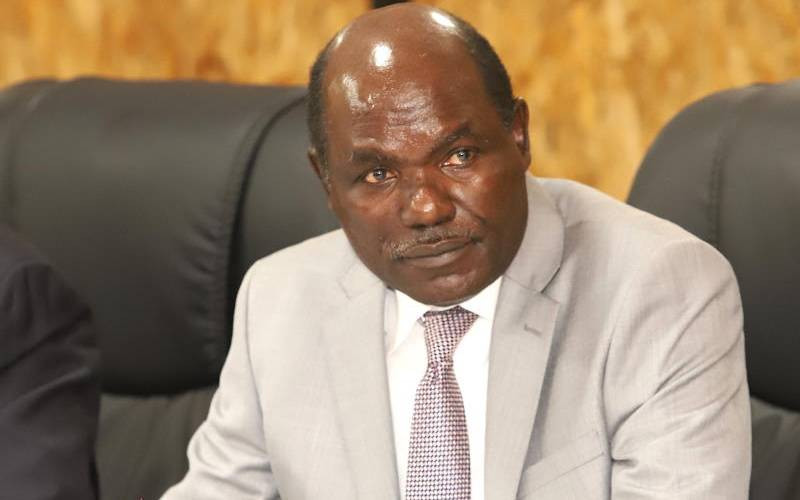
The former Mombasa-based lawyer had previously contested the Saboti parliamentary seat on an Orange Democratic Movement ticket, losing to former Defence Cabinet Secretary Eugene Wamalwa. Plucked from obscurity, he was not the man who would strike most as controversial.
Chebukati was the unlikely candidate to take over the IEBC, having reportedly been among the poorest performers in interviews by the commission’s selection panel.
In November 2016, nine months before the general election, the selection panel recruiting IEBC commissioners shortlisted five candidates who would be interviewed for the chairperson job – Margaret Shava, Mutakha Kangu, Roseline Odede, David Mereka and David Malakwen.
Chebukati, who was not among the 13 who initially applied for the position, sought the job when the panel revoked the shortlist and re-advertised the position. After interviews by the panel, he would be nominated alongside lawyer Tukero ole Kina in the final shortlist presented to Uhuru.
His appointment in January 2017, against a recommendation to have the electoral commission in place two years before an election, essentially set him up to fail. And fail he did. It was the second election that was conducted electronically, which resulted in widespread failures in vote tallying. In 2013, Hassan’s commission ran an embarrassing election that witnessed a failure in voter identification gadgets.
After the nullification of Uhuru’s victory, the opposition would boycott a repeat election ordered by the apex court, demanding changes in the IEBC’s leadership. To Raila and his allies, everything was simple. Chebukati had to go.
The former chair had escaped initial scrutiny, having been among the commissioners who admitted they bungled the 2017 presidential poll. Raila focused more of his energy on former commissioners Abdi Guliye and Boya Molu, and former Chief Executive Ezra Chiloba.
Facing pressure from the defunct National Super Alliance (Nasa), Chebukati said everything the opposition wanted to hear, but it mostly involved deflecting blame to others. Indeed, he joined the bandwagon of those demanding the resignation of secretariat officials, with a leaked September 2017 memo revealing the differences within the commission.
Chebukati and CEO Ezra Chiloba would be embroiled in a legal battle over the latter’s suspension from the IEBC, and subsequent exclusion from managing the repeat poll, overseen by Marjan Hussein Harjan, then deputy CEO, and ugly exchanges over tender wars. A visibly desperate Chebukati would later air his frustrations in public.
“It is already painful for me to be on record as the chairman of the IEBC that presided over an election that was nullified by the Supreme Court,” he told a press briefing on October 18, 2017. “I have made these points on numerous occasions to my colleagues at the commission. I have made several attempts to make critical changes but all my motions have been defeated by a majority of the commissioners. Under such conditions, it is difficult to guarantee free, fair and credible elections.”

In a separate interview, former commissioner Roslyn Akombe, the first to admit that the IEBC could not conduct a credible poll, had painted the picture of an IEBC chair under siege by other commissioners, which she had stated in her resignation letter.
“The Commission has become a party to the current crisis. The Commission is under siege. It has become increasingly difficult to continue attending plenary meetings where Commissioners come ready to vote along partisan lines and not to discuss the merit of issues before them,” Dr Akombe had said in her letter.
Back then, Ruto was not Chebukati’s biggest fan, faulting him for deflecting blame when the buck stopped with him. Indeed, it is a trait that Chebukati, often criticised as a control freak, has struggled to shake.
“I ran an open-door policy as chair and any of the commissioners who had an issue, including commissioner Masit, always walked to my office,” Chebukati had told a tribunal hearing a petition of Masit’s removal.
If remarks by his former colleagues are anything to go by, they did not agree with this self-assessment.
“By his actions and conduct… the chairperson mistakenly turned the commission into a one-person show and in the process, effectively subverted the constitution and the elections laws,” Cherera had said in affidavits before the Supreme Court as it heard Raila’s petition against Ruto’s election.
Former commissioner Margaret Mwachanya had hit equally hard.
“For far too long, and way too many times, the commission chair has failed to be the steady and stable hands that steer the ship in difficult times and gives direction when needed. Instead, under his leadership, the commission boardroom has become a venue for peddling money, misinformation, grounds for brewing mistrust and a space for scrambling for and chasing individual glory and credit,” Mwachanya said in the wake of the 2017 poll.
The Supreme Court, too, would also fault Chebukati’s leadership, saying there was a serious malaise in the commission’s management even as it vindicated its conduct of the presidential election.
Policy reforms
“The Court retains a constitutional obligation to point out the institutional dysfunctionality undermining the optimal functioning of IEBC. It is clear to us that there are legal, policy and institutional reforms that are urgently required to address the glaring shortcomings within IEBC,” the Supreme Court stated in its 2022 judgment.
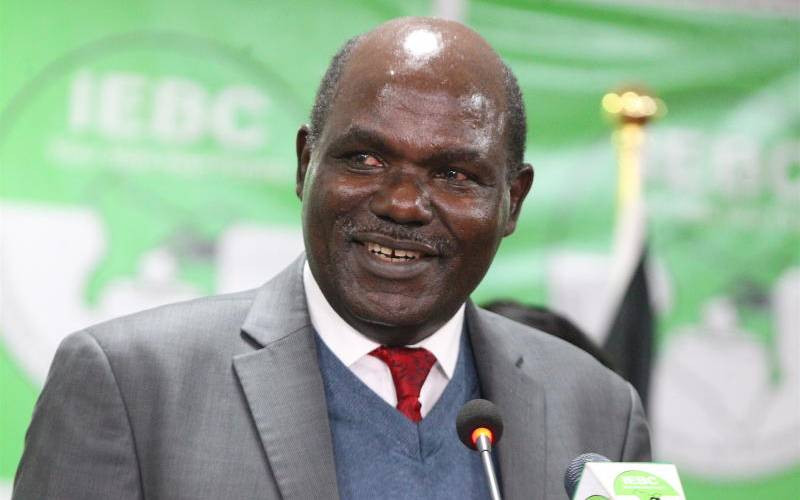
But other colleagues with whom Chebukati weathered calls for resignation, have spoken kindly of their former colleague.
“I am here having worked with the chairman for five years for six years and I’m best blessed to judge the chairman more than anyone else and I do believe the chair had been inclusive and consultative in his decision-making process,” Guliye said previously.
Dr Akombe had previously described Chebukati as having “his heart in the right place.”
“I applaud him for being a very good leader for being somebody who’s very calm who’s there who has his heart in the right place. He wants to do well for the country,” Akombe said in an interview in October 2017. “I hope the Kenyan people will give him a chance to be able to lead that commission to something that is much better than what we have right now.”
On Friday, she said she was “still processing the news of the passing of a colleague that I worked with during a difficult time.”
Chebukati has overseen two general elections (2017 and 2022) and three presidential contests, much against the expectations of many. Ahead of the 2022 polls, the opposition had demanded their resignation but these calls were muted after Uhuru’s handshake with Raila in March 2018.
Chebukati is survived by his widow, Mary Chebukati, and three children: Rachel, Jonathan and Emmanuel.
